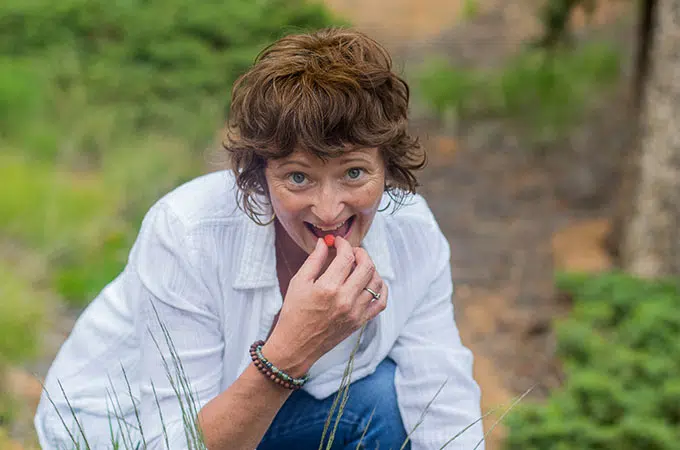Taking care of your skin is more than just what you put on your body. Healthy-looking skin is also a reflection of what you eat. Nutrient and mineral deficiencies can cause acne, eczema, premature aging, and wrinkles. Several essential macro and micronutrients play a role in building and maintaining beautiful skin. Let’s look at three vitamins (A, B, & C) that affect skin health and discuss signs of possible deficiency and food sources that contain these nutrients.
Vitamin A and Skin Health
Vitamin A is essential for developing healthy organs and tissues, like the epithelial tissue of our skin. When we don’t get enough of this vitamin, we lose the barrier on our skin that protects us against infectious microbes and irritants. Acne, dry skin, keratosis pilaris, and peeling or ridged nails are all visible signs we may need to include more Vitamin A in our diet.
Since Vitamin A is fat-soluble, some fat is needed in the diet to be able to absorb it. Our body stores about 90% of Vitamin A in the liver. Leafy greens are a great source of this vitamin. Our body can convert some plant pigments, like beta-carotene, into Vitamin A. You’ve probably heard of how the beta-carotene in carrots is good for eyesight. Well, beta-carotene is also responsible for some red, orange, yellow, and even dark green colors in fruits and vegetables, making this phytochemical easy to spot in the grocery store! A few of my favorite plant sources of beta-carotene (precursor to Vitamin A) are squash, kale, carrots, mangos, apricots, cantaloupe, pumpkin, broccoli, and sweet potatoes.
Some lifestyle choices, like mineral oil laxatives, antacids, and broad-spectrum antibiotics, can deplete our vitamin A sources. You may think supplementing your diet with Vitamin A (in pill form) is a good idea. In a word, DON’T. Always talk to a qualified medical provider before taking any fat-soluble vitamin (A, D, E, & K) supplement. Because these vitamins are stored in the body and not ‘flushed away’ like water-soluble vitamins, you can overdose! Thankfully, it is rare to overdose on Vitamin A from food sources, so eat the rainbow!
Vitamin B and Skin Health
A complex of B vitamins works together to facilitate energy metabolism in the body. I’ll cover some B vitamins that are especially important for skin, hair, and nail health.
Riboflavin (B2)
You need B2 to metabolize carbohydrates, amino acids, and fats, the components that make up healthy eyes, skin, nails, and hair. Signs of possible deficiency are premature wrinkles, eczema, rosacea, dermatitis, acne (oily skin with white heads), lip ulcers, and cracked lips. Sources of Riboflavin include almonds, oysters, sunflower seeds, spinach, and green peas.
Pantothenic acid (B5)
You need B5 to produce neurotransmitters for healthy nervous system function and protection against stress, toxins, and premature aging. Deficiency signs to look for are eczema, graying hair, and susceptibility to infections. Sources of B5 are easy to include in your diet; just add avocado, peanuts, baked potatoes with skins, tomatoes, oranges, almonds, and broccoli to your grocery list.
Pyridoxine (B6)
Your body needs B6 to assist amino acids in converting protein to energy. It is also necessary for healthy brain function. Indications of a possible deficiency include oily, scaly skin, acne, dermatitis around the eyes and nose, cradle cap, eczema, and dandruff on the scalp and eyelids. Bananas, peanuts, apricots, carrots, green peppers, carrots, potatoes, asparagus, and green leafy vegetables are all good plant sources of B6.
Folic Acid (B9)
We need B9 for healthy skin and hair, to prevent and heal infections, and for protein metabolism. Deficiency signs can appear on the body as cracks in the corner of the mouth, brown spots on the skin, graying hair, or hair loss. Sources include green leafy vegetables, broccoli, asparagus, nuts, sprouts, mushrooms, and dates.
Vitamin B12
Your body needs B12 to produce and regenerate red blood cells and keeps the nervous system healthy. Signs of possible insufficient B12 intake may show up as sores at the corners of the mouth, swelling in the face, premature graying and hair loss, yellowish complexion, and a swollen tongue. We can find B12 in plant sources like fermented food, soybeans, seaweed, sunflower seeds, and kelp.
Vitamin C and Skin Health
Vitamin C (Ascorbic Acid) is an antioxidant that protects against stress on the body preventing damage to cells and tissues. It also assists with the production of collagen, the most abundant tissue in the body, which provides a structure for bone, teeth, skin, tendons, and more. Inadequate levels of Vitamin C may look like acne, brown skin spots, easy bruising, eczema, skin ulcers, slow wound healing, premature aging and wrinkles, and bleeding gums. So again, look for colorful fruits and vegetables in the fresh produce section of your grocery store. Vitamin C is abundant in citrus fruits, kiwi, berries, melons, cabbage, tomatoes, broccoli, and sweet peppers. The skin is sometimes referred to as the third kidney because it eliminates 1/3 of the body’s waste through sweat and perspiration. Nourish this cherished organ with the vitamins and minerals it needs to shine and keep your skin healthy, starting with the ABCs. As a side note, our Beauty Balm has a 10% concentration of Vitamin C, which is a fantastic skin moisturizer for dry skin. It can help replace C, which may be deficient in your diet.
References
Petersen, D. (2020). NUT 308: Holistic nutrition (20th ed.). Portland, OR: American College of Healthcare Sciences.
Thompson, J., & Manore, M. (2018). Nutrition: An applied approach (5th ed). Boston, MA: Pearson. ISBN: 9780134551944

